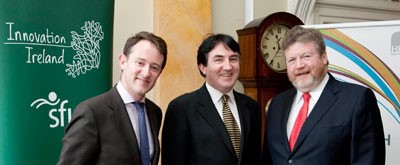CRVB in the news

International Academy of Cardiology: Prof Noel M. Caplice, M.D., Ph.D.: THE ROLE OF PROGENITOR CELLS
UCC team develops medical device alternative to open-heart surgery
The University College Cork (UCC) Centre for Research in Vascular Biology has developed a medical device that promotes the bypass of arterial obstructions, potentially removing the need for open-heart surgery.
Director of the centre Prof Noel Caplice, himself a practising interventional cardiologist, led the research project in UCC, which included collaborators in the Mayo Clinic in the US.
Caplice began this project in the Mayo Clinic, where he and his colleagues designed a mesh device that could be attached to a stent, which could deliver millions of cells and promote bypass in an obstructed artery.
Since his return to UCC in 2005, Caplice has further developed this technology so it can be delivered using a catheter.
The vascular cell delivery device can be inserted via a keyhole procedure through the artery to the site of the obstruction. The implanted device can then promote micro-bypass of the obstruction over a four-week period, resulting in the return of normal heart function and a recovery of full exercise capacity.
The device has been tested successfully in a large animal model with similar-sized arteries to humans, and the next phase of this research will involve testing on patients who require bypass surgery but have been deemed unfit to undergo the procedure.
About 3m open-heart coronary bypass and peripheral artery bypass operations are carried out each year around the world. However, around 20pc of patients who need this surgery are unable to undergo the procedure due to poor status of arteries or a co-existing illness making the risk too great.
“If reproduced in humans, this device would offer an alternative to open surgical bypass operations with implications for treatment of patients who are currently inoperable,” said Caplice.
“It also has the potential to reduce costs and time spent in hospital,” he added.
This research, which could be a major step forward in the treatment of coronary disease, has been published in the journal Biomaterials.
Listen to an interview with Prof Noel Caplice broadcast on the 25th of August 2014 on RTE Radio One's Morning Ireland.
Further media coverage is available on here on Storify.
UCC Researchers Make Heart Injection Breakthrough 08.06.2011
|
||||
Top Prize won by CRVB Investigator at American Cardiology Meeting 06.04.2011

Dr John O’Sullivan (in photo) from CRVB won the Young Investigator Award at the American College of Cardiology (ACC) Meeting in New Orleans this week.
This ACC meeting is one of the largest of its kind in heart disease in the world and the Young Investigator competes in open international competition with the best cardiac research projects from around the globe. The work presented at the meeting described for the first time the dramatic effects of a single low dose of insulin like growth factor (IGF1) on heart muscle recovery after a large heart attack in an experimental model. More than a million people each year develop heart failure after large heart attacks despite the best currently available therapy. Congratulations John.
